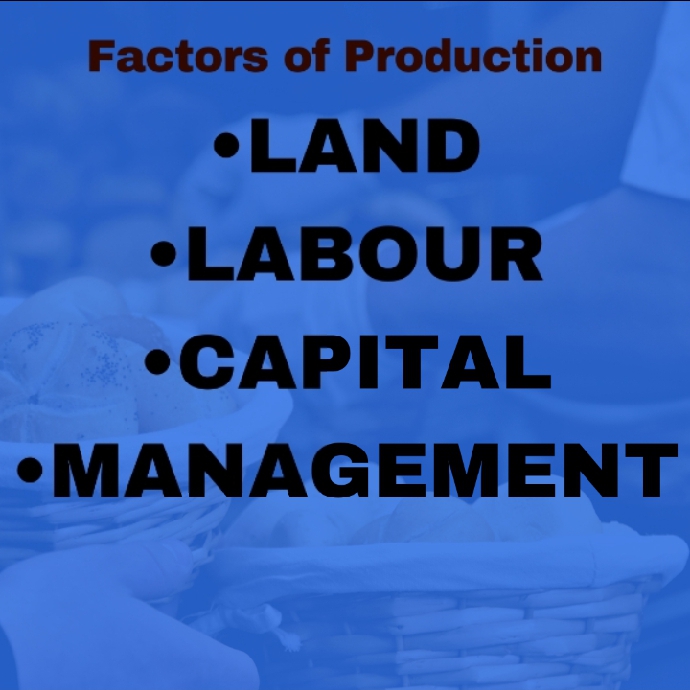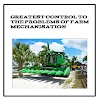Production can simply be defined as all the economic activities which result in the making or creation of goods and service. In other words, production is actually thr process of making goods and as well as providing providing services.For goods and services to be made during production, certain factors need to comes together. Those factors that comes together is known as the factors of production.
There are four factors of production which includes Land, Capital, Labour and Entrepreneur or Management.
Land
Land can be defined as a place where the productive activities such as growing of crops, rearing of animals and establishment of farmstead , etc, are carried out.
Features of Land
1. Land is one of the factors of production.
2. Land is immobile and a fixed factor meaning it can not be moved from one place to another.
3. Land is a free gift of the nature.
4. A land also include soil, minerals, water and vegetations.
5. The reward of land is rent from tenants.
6. A land can appreciate or depreciate.
7. The value of land can be determined by it's location.
8. It can be used for collaterals for loans.
9. The quality of land can be improved by many methods.
Importance of Land in an Agricultural Enterprise
1. Land can be used for the cultivation of food crops like maize,rice,cowpea.
2. Land can be used for rearing animals.
3. Land can be used for the rearing of animals.
4. It can be used for fish pond production.
5. Land can be used for forest development.
6. Land can be used for collaterals for securing a loan from banks.
7. It is used for wildlife conservation.
Non-agricultural Use of Land.
1. Land is used for construction purpose such as roads, airport etc.
2. Land is used for mining purposes such as gold, extraction of petroleum etc.
3. Land is used in residential buildings.
4. It can be used for social or recreational purposes such as stadia,schools, market etc
5. Land can be used for industrial buildings.
Appreciation of Land
Land can increases in it's value through the following ways:
1. Fallowing - Fallowing can be defined as the process whereby a farmland is allowed to rest to regain it's lost nutrients after using the land for a long time.
2. Addition of fertilizers or manure to increase it's fertility.
3 Using a clean uninfected input like seeds to prevent the soil from pest attack.
4. Weeding to remove the weeds that can compete with crops for nutrients and space.
5. Irrigation- this is the artificial supply of water to the soil to supplement when there is no sufficient rain
6. Good soil tillage that can prevent soil erosion.
7. Good drainage service - this is the removal of excess water from soil to promote crop growth.
Depreciation of Land
Land can decreases in its value through the following ways:
1. Abuse of Land such as overgrazing, indiscriminate bush burning.
2. Water logging - this actually removes the fertility of soil.
3. Dumping of toxic materials in the body of land which reduces the fertility of soil.
4. Infestation of weeds - this remove the nutrients from the soil.
5. Continuous cultivation without the use of manure.
Labour
Labour can be defined as all the productive human efforts that are out into or used in the process of production. It also refer to the man mental and physical power in the process of production.
Features of Labour.
1. Human effort can be in form of intellectual or mental, manual or physical, provided that ia directed towards the production of goods and services.
2. Labour is mobile and has feeling which cannot be used anyhow.
3. Labour exist in three kind which includes
(a) Skilled Labour: This is a white collar jobs and are for the highly educated and technical people to provide expertise in production.
(b) Semi-skilled Labour : These people are averagely educated people that are used to perform simple operation in the process of production.
(c) Un-skilled Labour : This is a brown collar job that are for the less previledge people who didn't go to school and are used for manual operation.
4. The reward of labour is wages and salary.
5. The unit of labour is man-hours or man-days.
Form of Labour available for Production
1. Family Labour - This refers to the labour that is being provided by the man, his wife and children. The father organise the family labour himself especially for farmers.He woll be the one to assign job to each and everyone of the family members.This is the major sources of labour.
2. Personal Labour : This is the labour provided by the owner of the business or farm itself.
3. Communal Labour : This is the kind of labour that is being provided people in your community which you will do the same to them.
4. Hired or Paid Labour - This is the kind of labour that the owner of the business employ to work for him which he will pay either daily or monthly. This sources of Labour is very expensive and is used in big business sector and big farms.
Importance of Labour in Production
1. This factor uses other factors for production.
2. Intellectual labour ensures high productivity in businesses and farming sectors.
3. Labour ensures the success of every business sectors.
Capitals
Capitals is one of the factors of production which includes all man made productive asset that are used in production. In other words, these are assets made by man to enable him produce goods and services and used to pay for labour,land and management.
Features of Capital
1. Capital is the most important factor of production.
2. It can appreciate or depreciate
3. Examples of capitals includes , hoe, cutlass, tractors, cash in hand, and building.
4. Sources of capitals includes bank loans, personal saving, cooperative societies etc.
5. This factor of production is used to acquire alk other Factors of production.
6. The reward of capitals is interest.
7. Capitals is used to purchase farm inputs e.g seed, agro-chemical etc.
8. Capital can be grouped into two classes namely:
(a) Fixed Capital : These are the capital or asset that are purchased for continuous use in production.The item are not used up during production. Examples of fixed capitals includes farm building, companies, motor vehicles, farm tools, machines, land furniture etc.
(b) Working or Variable Capital: These bare capital or asset which are used up during the process of production. Examples includes; cash, fertilizer , chemicals , vaccines, seeds , feeds etc.
Importance of Capitals in Production
1. Working capital is used for paying wages or salaries workers.
2. Fixed Capital in form of machinery makes works easier and increases productivity.
3. Fixed capital in form of houses provides shelter for workers and serves as agent protection against sun and rain.
4. Working capital bus used to purchase farm inputs like seed etc, feeding livestock etc.
5. Capital is used to establish business.
Management
Management is one of the factors of production that refers to a person or group of people who co-ordinator, organise and control the use of other factors of production. This factor is really important and should be ranked number two in the factors of production because it control all other factors of production. The person that produces goods and services is called the management or entrepreneur.
The management determines what to produce , when to produce and type of what to produce.
Features of Management
1. It involves the skill of management of individual
2. It coordinate and control ball other factors of production.
3. The cost of management is determined by it's quality.
4. This involves decision making.
5. Management reward is profit.
Functions of A Farm Manager
The function of a farm manager can be grouped into five major headings which includes
1. Organisation
2. Administration
3. Production
4. Marketing
5. Evaluation







0 Comments